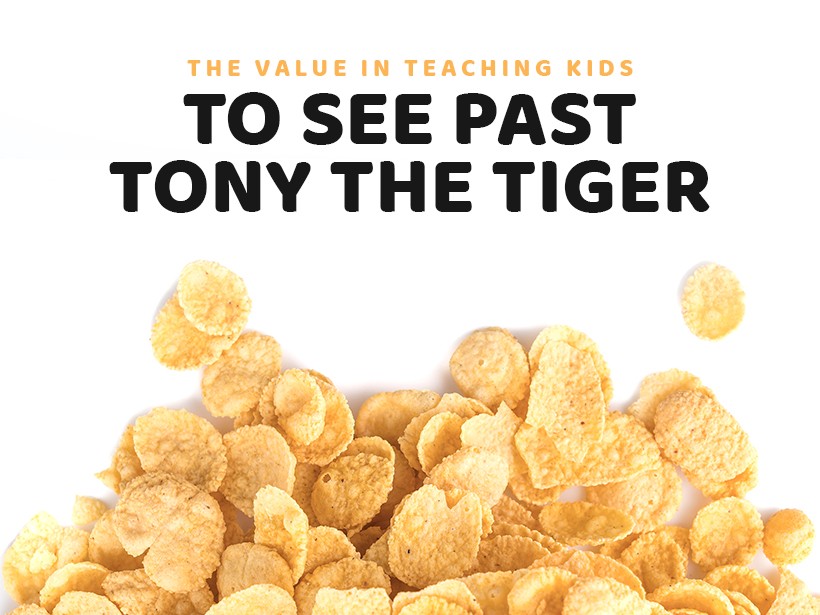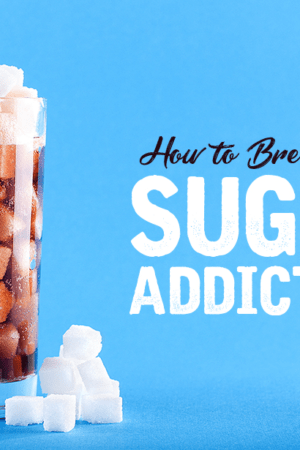Sometimes all it takes is a little push. For years, junk food and soda companies have been barraging kids with advertisements selling their dangerously sweet and unhealthy products. If you grew up in the ‘90s, it felt all too normal: favorite Nickelodeon shows seamlessly faded into Hawaiian Punch commercials, and Tony the Tiger hit a home run at what might as well have been your local little league field.
Things have changed a bit since then, as the adult public has begun to recognize the predatory (and often cigarette-ad-inspired)1 influences behind these and other methods of peddling sugary, processed products to kids. But make no mistake: marketing departments are hard at work finding innovative new ways to hook kids on the same old neon rainbow of carbonated, microwavable junk.
Unmasking junk food mascots and other unsavory marketing methods
What if you pushed kids in the right direction, away from these flashy and misleading ads? A new study published in the journal Nature Human Behavior asks precisely that question and comes up with some exciting results.2 Researchers at the University of Chicago countered the positive associations in junk food ads by pitting them against some time-honored teenage values, including “social justice and autonomy from adult control.”
The study’s authors split 536 eighth graders into two groups. The researchers showed kids in the first group the kind of boilerplate healthy eating advice that most of us remember well, in one form or another, from elementary and middle school. Kids in the second group, however, read about the cynical marketing practices of large junk food producers and their grab bag of techniques for luring kids.
According to the results, kids in the second group changed their eating habits significantly after reading about these manipulative practices. Boys, in particular, were found to consume 31 percent less junk food for the three months remaining in the school year. The group was also found to make significantly fewer positive associations with junk food advertising months after the study began.
A new strategy for keeping kids off sugar and junk food
“Most past interventions seemed to assume that alerting teenagers to the negative long-term health consequences of bad diets would be an effective way to motivate them to change their behavior,” said Christopher Bryan, one of the study’s authors. “That’s clearly a problematic assumption.” Bryan says he thinks that line of thinking has perhaps been the primary reason why schools and public awareness campaigns have struggled so much to make a dent in kids’ eating habits.3
The hope among the researchers is to give kids the resources they need to combat these forms of advertising and produce a “lasting, internalized change” in their dietary decisions. Indeed, studies like this one are invaluable when it comes to developing smarter methods for pushing kids towards healthy eating.
NUTRITIONAL DISCLAIMER
The content on this website should not be taken as medical advice and you should ALWAYS consult with your doctor before starting any diet or exercise program. We provide nutritional data for our recipes as a courtesy to our readers. We use Total Keto Diet app software to calculate the nutrition and we remove fiber and sugar alcohols, like erythritol, from the total carbohydrate count to get to the net carb count, as they do not affect your blood glucose levels. You should independently calculate nutritional information on your own and not rely on our data. The website or content herein is not intended to cure, prevent, diagnose or treat any disease. This website shall not be liable for adverse reactions or any other outcome resulting from the use of recipes or recommendations on the Website or actions you take as a result. Any action you take is strictly at your own risk.
- California Pushes for Cigarette-Like Warning Labels on Soda - July 1, 2019
- Is a Slowdown in Australia's Sugar Consumption a Sign of More to Come? - June 24, 2019
- Groundbreaking Study Says the Sugar Rush Doesn't Exist - June 12, 2019































